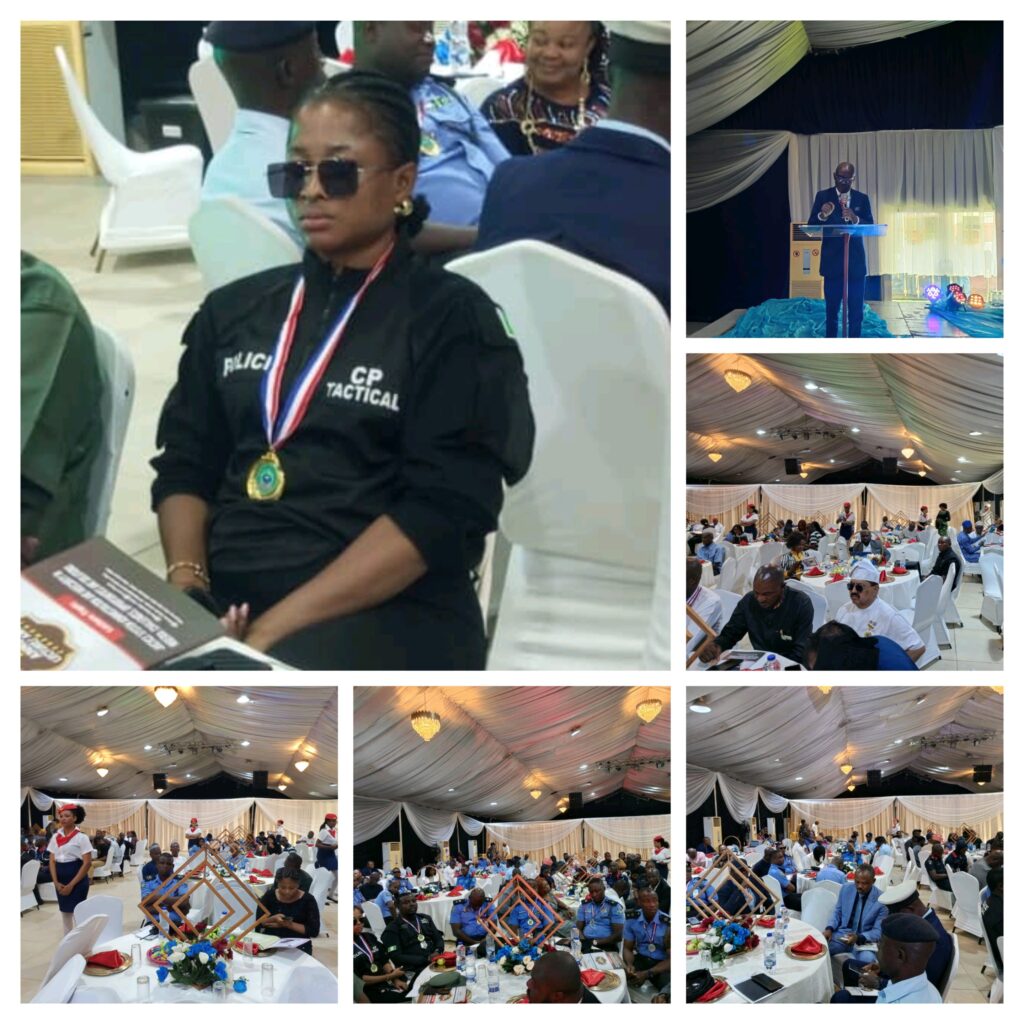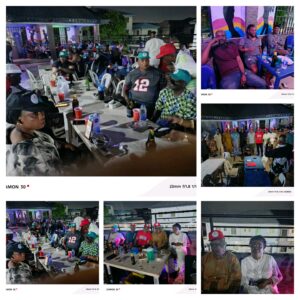Corruption Remains Most Persistent Challenge Affecting Institutions, Undermining Policy-Decision Making, Says Chairman ICPC. Watch Video Below

Share this Post
The Chairman of the Independent Corrupt Practices Commission (ICPC), Dr Musa Adamu Aliyu, a Senior Advocate of Nigeria (SAN) has opined that corruption remains one of the most persistent challenges affecting all sectors and institutions of the Nigerian society, undermining policy-decision making.

Aliyu said this while delivering the keynote address on, “Justice System Administration And Insecurity In Nigeria: Challenges, Opportunities And Solutions,” at the 2024 Annual Lecture/Award Ceremony organised by the Crime Reporters Association of Nigeria on the 5th December 2024.
The chairman said he was happy to be x-raying the multi-faceted challenges faced by the Justice systems administration and the security sector in Nigeria, highlighting the prospects of implementing behaviour change and imbibing corruption prevention attitude to achieve effectiveness, efficiency and transparency in the sectors.
He therefore stressed: “Corruption remains one of the most persistent challenges affecting all sectors and institutions of the Nigerian society, undermines policy-decision making, resource mobilisation and utilisation, policy execution and service delivery. Our experience at the ICPC in partnership with key stakeholders, has shown that tackling corruption effectively, across sectors and institutions, requires a proactive, multi-faceted approach. This approach should focus not only on enforcement but also on prevention, deterrence, and systems reform.”
According to Aliyu, the Justice System Administration faces institutional, funding, infrastructural, human resources, and socio-cultural challenges.
He said that of all these, insufficient budgetary allocation hinders the effective functioning of the justice system, leading to inefficient court administration, poor management of court processes, inadequate record-keeping, and lack of technological support was most affecting.
He added: “The widespread corruption within the justice system, including bribery, influence peddling and attitudinal challenges are more fundamental and daunting. I dare say that the justice sector remains a focal point of concern, particularly regarding bribery involving stakeholders in the justice sector, and despite limited public contact, judicial officials exhibit relatively high bribery prevalence, hence the need for targeted anti-corruption measures in this sector.”
Aliyu noted that there was a limited adoption and use of technology, such as electronic filing and digital record-keeping, which at this time and age, is a sad commentary on the justice system administration.
He also said that the justice sector remained the fulcrum of concern in the fight against corruption, and the new norm now was the admissibility of electronically generated evidence and the introduction of technology in the administration of justice in our judicial system.
“There is a challenge of inadequate court infrastructure, as indicated by outdated and poorly maintained court buildings, inadequate seating, and insufficient facilities. With this scenario, if nothing else, morale is affected and service delivery is impaired,” said Aliyu.
He noted that it would be wrong if he failed to mention the challenge of inadequate prison facilities, which is causing overcrowding, poor sanitation, and inadequate healthcare in prisons.
“The sore point is that inmates of Nigerian prisons hardly get corrected, reformed or subsequently rehabilitated,” he added.
He further maintained that the justice system is also faced with human resource challenges, which is a shortage of judicial officers and, an insufficient number of judges, magistrates, and others.
Added to this, are inadequate training, capacity-building and development opportunities for judicial officers, prosecutors, and other stakeholders.
He noted that there were also low salaries and poor working conditions for judicial officers and other stakeholders as other challenges.
Speaking on socio-cultural challenges, Aliyu said: “There are still some traditional and cultural practices that hinder access to justice, particularly for vulnerable groups. For instance, it has been observed that there are disparities in access to justice based on social status, wealth, and influence and that some people may have limited access to justice because they do not speak the dominant language.
“As an anti-corruption practitioner who superintends over investigation and prosecution of corruption cases, what readily comes to mind as a key challenge is the inefficient management of criminal justice institutions.
“Despite the good intentions of the Administration of Criminal Justice Act (ACJA) 2015, which aims to reform the system, the implementation has been somewhat slow and inconsistent. For instance, there is still a lack of a functional Central Criminal Records Registry and inadequate reporting by law enforcement agencies, frustrating a major objective of the reform effort, the non-availability of a criminal database.”
Again, a major issue mentioned by Aliyu is the delay in the Administration of Justice, which in itself inadvertently undermines the integrity of the system.
“Unnecessary and excessive delays in the justice system always lead to frustration and disillusionment. As a part of the system, the Commission knows that this delay is often caused by inadequate record-keeping, lack of technological support, poor oversight of the prosecutors and compromised attitude of the administrators,” said Aliyu. “A number of our cases are more than ten years old, which we recently reactivated, and we are determined to surmount the challenge by taking the matters to their logical conclusion to avoid situations of ‘justice denied’.”
Aliyu maintained that despite the ACJA’s provisions, the inability of the justice system administration to actually ‘protect the society from crimes’ is another area of concern.
His words: “Criminality remains rampant and the system fails to promptly bring offenders to justice. This state of affairs and lack of accountability in the system encourage more people to engage in criminal activities. Furthermore, while the ACJA has improved the protection of defendants’ rights, vulnerable defendants still face significant challenges, as the protection of the Rights and Interests of Suspects and Defendants is often compromised along the line.
“There is still an ongoing challenge of promoting the ‘Rights and Interests of Victims’. Although the ACJA recognizes victims’ rights, its implementation remains inconsistent, and awareness among law enforcement personnel, legal practitioners, and judicial officers remains limited.”
He explained that addressing these challenges required a multi-faceted approach, including strengthening institutions, improving record-keeping, and enhancing awareness and more active implementation of the ACJA’s provisions.
“Doing this will equally involve all stakeholders, including the government, judiciary, legal profession, and civil society,” he said.
While dissecting the challenges of insecurity in Nigeria, Aliyu said Nigeria faces numerous security challenges that threaten the country’s stability and development.
He stated: “The militant terrorists, Islamist groups, particularly Boko Haram and its offshoot, the Islamic State in West Africa (ISWA) have been responsible for numerous attacks, kidnappings, and killings, especially in the North East region. Also, there is the rise of organised criminal gangs, which have been involved in kidnappings, cattle raids, and armed robberies, targeting schools, villages, and highways, especially in the North West region.
“The Farmer-Herder Conflict, driven by competition for land, resources, and water, and resulting in numerous clashes, killings, and displacements, is also a significant security challenge, particularly in the Middle Belt and North West regions.
“Additionally, militant separatists, particularly in the South East region, have been involved in violent clashes with security forces. The Indigenous People of Biafra (IPOB) and its paramilitary wing, the Eastern Security Network (ESN), have been accused of promoting anti-Fulani sentiment and enforcing a ban on grazing in the region.
“Lastly, widespread kidnappings and banditry are significant security challenges in Nigeria, with many cases reported across the entire country. These crimes are often committed by armed gangs and militants, who demand ransom payments from victims’ families.”
He suggested that to effectively address the insecurity in Nigeria, a comprehensive multi-faceted approach was required because the security challenges are also complex and multifaceted.
He said that although the nexus between justice system administration and insecurity in Nigeria is complex and multifaceted, Nigerians should try to make some connections because by acknowledging it, “we can work towards breaking this cycle and promoting a more just, secure, and prosperous society; on one hand, an ineffective Justice System manifests with slow court processes and the ensuing delayed justice will lead to frustration, mistrust, and a sense of impunity, fuelling insecurity.”
He emphasised that when there is a lack of accountability in the justice system administration, the failure to hold perpetrators accountable for crimes will embolden them to continue perpetuating a cycle of violence and insecurity. And, “Corruption within the justice system will undermine trust and create opportunities for criminals to further exploit.”
On the other hand, stressed Aliyu, “insecurity breeds crime and violence, which will overwhelm the justice system and exacerbate delays and inefficiencies. Also, criminal elements, terrorist and insurgent groups, corruptly exploit weaknesses in the justice system to recruit, radicalize, and perpetuate violence.
“Indeed, one can say that unchecked insecurity enables kidnapping and banditry, which will further destabilise the justice system. As consequences, the ineffective justice system administration and rising insecurity will erode public trust in institutions and foster a sense of hopelessness.”
He said that insecurity and ineffective justice system administration are known to aggravate human rights abuses, including extrajudicial killings, torture, and arbitrary detention. He also insists that insecurity and ineffective justice system administration have severe socio-economic consequences, including displacement, poverty, and economic stagnation.
Reeling out solutions to some of the aforementioned challenges, Aliyu said: “As short-term solutions, the immediate adoption of automation and digitalization regime, which will include implementing technology to automate court processes, case management, and record-keeping. The justice sector needs to implement effective case management systems to reduce delays and improve efficiency.
“In the short term, the upgrading and maintenance of court infrastructure, including buildings, furniture, and equipment as well as the provision of regular training for judges, magistrates, and court staff to enhance their skills and knowledge, will turn around the challenging situation.
“Long-term solutions proposed for effective, efficient and accountable justice system administration are as follows; comprehensive and better coordinated Judicial Reform to address issues of independence and financial autonomy, accountability and transparency across the levels of the system. There should also be legislative reforms which involve the enactment of laws that promote justice, equality, and human rights, and the review of existing laws to ensure they are consistent with international standards.
“Access to justice must be improved for the marginalized groups, including women, children, and people with disabilities.”
He calls for a programme of corruption-prevention or reduction, measures to prevent or reduce corruption within the justice system, including the use of technology to track cases and prevent tampering, should be purposefully implemented.
He added: “It is imperative to establish a robust court administration system that will be more effective and efficient in managing court operations, including case management, finance, and human resources.
“As a corollary to this, there should be institutional strengthening such that the National Judicial Council (NJC) will be strengthened to ensure effective oversight and accountability of the judiciary and the Judicial Service Commission (JSC) will be strengthened to more efficiently manage the appointment, promotion, and discipline of judicial officers.”
Aliyu, proposing a short-term and long-term solution to insecurity in Nigeria, said that there should be, employment and deployment of more security personnel to the troubled areas, enhancement of security capabilities and intelligence gathering to anticipate and prevent attacks, establishment of a community policing system to foster trust between security agencies and local communities and establishment of a rapid response system to quickly respond to security incidents.
On the long-term solution, he said that the government should address poverty, unemployment, and inequality, which he noted were the root causes of insecurity.
He said: “More investment in education and skills development programs to empower youths will greatly help. It will also be of great impact to implement economic empowerment programs to generally reduce poverty and inequality.
“Making significant investment in infrastructure development, such as roads, bridges, and public buildings to reflate the economy and enhance opportunities for meaningful livelihood. Also, the security sector should be honestly reformed to make it more effective, efficient, and truly accountable.
“I call for a more active promotion of national unity and cohesion through inclusive policies and programs. Indeed, if the justice and security sectors generally imbibe the 7 core values of the ICPC’s National Ethics and Integrity Policy, as adopted by the Federal Government in 2020, it will go a very long way to achieve both effectiveness and cohesion.
“I also recommend technological solutions such as installation of surveillance systems like CCTV cameras, to monitor public spaces, implementation of biometric identification systems to track and identify individuals, adoption of enhanced cybersecurity measures to protect national infrastructures against cyber threats, and use of data analytics to analyse security data and anticipate potential security threats.”
Aliyu said that it was obvious that at all levels; be it the level of policy formulation, level of resourcing and level of policy implementation, corruption, manifesting in attitude, behaviour and conduct which are lacking in integrity, transparency and accountability, plays a very ignoble role in creating the various challenges, as identified earlier.
“It is therefore for this singular reason that the ICPC proposes greater emphasis on behavioural change and corruption prevention attitude across the board, as the most pragmatic way to resolving the challenges. There is indeed enough for our needs but not our greed,” said the chairman.
He pointed out that ICPC’s Behaviour Change Initiative and Corruption Prevention Methodologies were applicable in all sectors and at all levels of government.
Also, “Our civil society engagement initiative has the potential to raise impactful and action-induced public awareness about the importance of an effective justice system and the need for reform of the security sector. Indeed, our coalition of NGOs -the National Anti-corruption Coalition -has always been at the forefront of advocacy efforts to push for justice sector reform and promote accountability within the security sector.
“They are ever ready for participation in justice and security initiatives to build trust and promote collaborative problem-solving approach. Our prevention tools, as exemplified by the ICPC System Study methodology and the Ethics and Integrity Score-Card, have the potency and capacity to monitor and evaluate the performance of the justice system as well as the Security sector and to identify areas for improvement.
“However, to be able to do much more, the Commission craves more resourcing in terms of personnel, funding, capacity enhancement, technology, community engagements and public support.”








